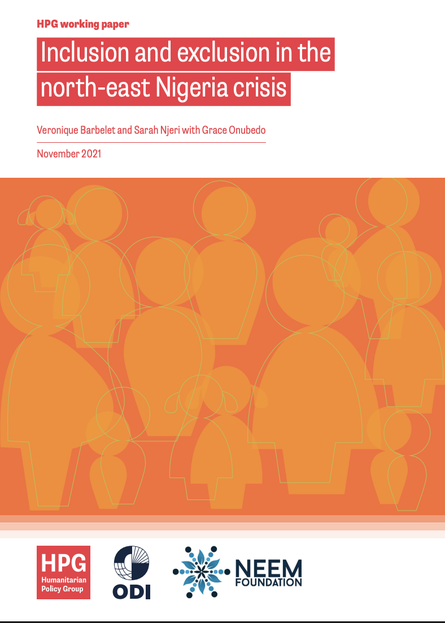HPG working paper

The humanitarian response in north-east Nigeria is an important opportunity to examine barriers to more inclusive humanitarian action in large-scale, complex and protracted displacement crises. Acknowledging the immense operational challenges facing humanitarian actors, this study found that the response is not systematically inclusive, which has led to the exclusion of entire communities, therefore undermining its relevance, effectiveness and impartiality.
This study found that a lack of adequate engagement with diverse communities and consideration of longer-term and structural processes of exclusion, as well as the specific exclusionary effect of the conflict, meant that the humanitarian response further exacerbated and contributed to the exclusion of already marginalised populations. The paper makes recommendations for immediate action by humanitarian actors in north-east Nigeria, as well as recommendations for tracking exclusion and supporting inclusive humanitarian action more broadly.
Recommendations
For tracking exclusion and supporting more inclusive humanitarian action:
- Ask who are we not seeing and check assumptions against data.
- Re-prioritise inclusion and impartiality as an operational and strategic focus, including through establishing a clearer policy framework.
- Invest in more disaggregated data and analysis to inform more inclusive practices.
- Link policy and operational efforts on inclusion, participation and localisation.
For immediate action by humanitarian actors in north-east Nigeria:
- The humanitarian coordination should tackle the issue of community dynamics and leaders’ corruption in the response as a matter of priority to reduce drivers of exclusion, including through: conducting a power and stakeholder mapping of community structures; revising community engagement guidelines; increasing engagement of community stakeholder groups; increasing post-distribution monitoring; and engaging community leaders directly in a dialogue on the findings of this report.
- The food security sector and its partners must revise food distribution practices to follow existing guidelines and good practices to ensure safe and dignified food distributions and support those who are physically vulnerable and at risk of physical exclusion in crowds.